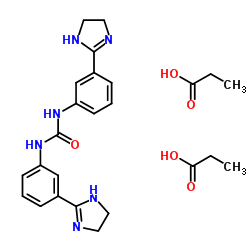二丙酸咪唑苯脲

二丙酸咪唑苯脲结构式

|
常用名 | 二丙酸咪唑苯脲 | 英文名 | Imidocarb dipropionate |
|---|---|---|---|---|
| CAS号 | 55750-06-6 | 分子量 | 496.559 | |
| 密度 | 1.39g/cm3 | 沸点 | N/A | |
| 分子式 | C25H32N6O5 | 熔点 | 205ºC | |
| MSDS | 中文版 美版 | 闪点 | N/A | |
| 符号 |

GHS07 |
信号词 | Warning |
二丙酸咪唑苯脲用途Imidocarb dipropionate 是一种有效的抗原虫剂 (antiprotozoal)。Imidocarb dipropionate 对寄生虫 B. bovis 具有活性,IC50 为 87 μg/mL。 |
| 中文名 | 咪多卡二丙酸盐 |
|---|---|
| 英文名 | 1,3-bis[3-(4,5-dihydro-1H-imidazol-2-yl)phenyl]urea,propanoic acid |
| 中文别名 | N,N'-双[3-(4,5-二氢-1H-咪唑-2-基)苯基]脲二丙酸盐 | 二丙酸咪唑苯脲 | 咪唑苯脲二丙酸盐 | 咪多卡二丙酸酯 |
| 英文别名 | 更多 |
| 描述 | Imidocarb dipropionate 是一种有效的抗原虫剂 (antiprotozoal)。Imidocarb dipropionate 对寄生虫 B. bovis 具有活性,IC50 为 87 μg/mL。 |
|---|---|
| 相关类别 | |
| 靶点 |
IC50: 87 μg/mL (Parasite B. bovis)[1] |
| 体内研究 | 丙酸咪多卡布通过皮下或肌肉注射给马(3.4毫克/千克体重)和牛(2.1毫克/千克体重)。在马身上,每72小时可给4剂。第二次给药可在第一次给药后2周[1]。丙酸亚胺卡布也用于绵羊(1。2毫克/千克体重)用于治疗巴贝虫病和无浆虫病[1]。丙酸亚氨基卡布在小鼠体内的急性口服LD50值在646~723mg/kg体重范围内[1]。大鼠经口急性半数致死量(LD50)为454~1251mg/kg体重[1]。 |
| 参考文献 |
| 密度 | 1.39g/cm3 |
|---|---|
| 熔点 | 205ºC |
| 分子式 | C25H32N6O5 |
| 分子量 | 496.559 |
| 精确质量 | 496.243408 |
| PSA | 164.51000 |
| LogP | 2.66700 |
| 外观性状 | 白色或灰白色结晶粉末 |
| 储存条件 | 保持贮藏器密封 放入紧密的贮藏器内,储存在阴凉,干燥的地方 |
| 稳定性 | 遵照规定使用和储存则不会分解。 |
| 水溶解性 | 可溶于:甲醇 |
| 计算化学 | 1.疏水参数计算参考值(XlogP):无 2.氢键供体数量:6 3.氢键受体数量:7 4.可旋转化学键数量:6 5.互变异构体数量:2 6.拓扑分子极性表面积165 7.重原子数量:36 8.表面电荷:0 9.复杂度:567 10.同位素原子数量:0 11.确定原子立构中心数量:0 12.不确定原子立构中心数量:0 13.确定化学键立构中心数量:0 14.不确定化学键立构中心数量:0 15.共价键单元数量:3 |
| 更多 | 1. 性状:固体 2. 密度(g/mL,25/4℃):无可用 3. 相对蒸汽密度(g/mL,空气=1):无可用 4. 熔点(ºC):205 5. 沸点(ºC,常压):无可用 6. 沸点(ºC,5.2kPa):无可用 7. 折射率:无可用 8. 闪点(ºC):无可用 9. 比旋光度(º):无可用 10. 自燃点或引燃温度(ºC):无可用 11. 蒸气压(kPa,25ºC):无可用 12. 饱和蒸气压(kPa,60ºC):无可用 13. 燃烧热(KJ/mol):无可用 14. 临界温度(ºC):无可用 15. 临界压力(KPa):无可用 16. 油水(辛醇/水)分配系数的对数值:无可用 17. 爆炸上限(%,V/V):无可用 18. 爆炸下限(%,V/V):无可用 19. 溶解性:无可用 |
| 符号 |

GHS07 |
|---|---|
| 信号词 | Warning |
| 危害声明 | H302 |
| 个人防护装备 | dust mask type N95 (US);Eyeshields;Gloves |
| 危害码 (欧洲) | Xn: Harmful; |
| 风险声明 (欧洲) | R22 |
| 危险品运输编码 | NONH for all modes of transport |
| WGK德国 | 3 |
|
Comparison of glycopyrrolate and atropine in ameliorating the adverse effects of imidocarb dipropionate in horses.
Equine Vet. J. 45(5) , 625-9, (2013) Imidocarb, an effective treatment for piroplasmosis, may cause colic and diarrhoea in horses. Atropine and glycopyrrolate are anticholinergics that could reduce the adverse effects of imidocarb. Howev... |
|
|
Failure of combination therapy with imidocarb dipropionate and toltrazuril to clear Hepatozoon canis infection in dogs.
Parasitol. Res. 109(3) , 919-26, (2011) Current treatments with imidocarb dipropionate for infected dogs with Hepatozoon canis do not always provide parasitological cure. The objective of this study is to determine whether concomitant use o... |
|
|
Alterations in some blood coagulation parameters in naturally occurring cases of canine babesiosis.
Acta Vet. Hung. 57(2) , 295-304, (2009) Changes in coagulation parameters were studied in dogs naturally infected with Babesia canis canis (n = 30), and haemostasis was evaluated and compared to values obtained from healthy dogs (n = 29). T... |
| MFCD00013161 |
| Imizol |
| Imidocarb Dipropionate |
| Propanoic acid - 1,3-bis[3-(4,5-dihydro-1H-imidazol-2-yl)phenyl]urea (2:1) |
| Propanoic acid, compd. with urea, N,N'-bis[3-(4,5-dihydro-1H-imidazol-2-yl)phenyl]- (2:1) |
| EINECS 259-791-8 |


